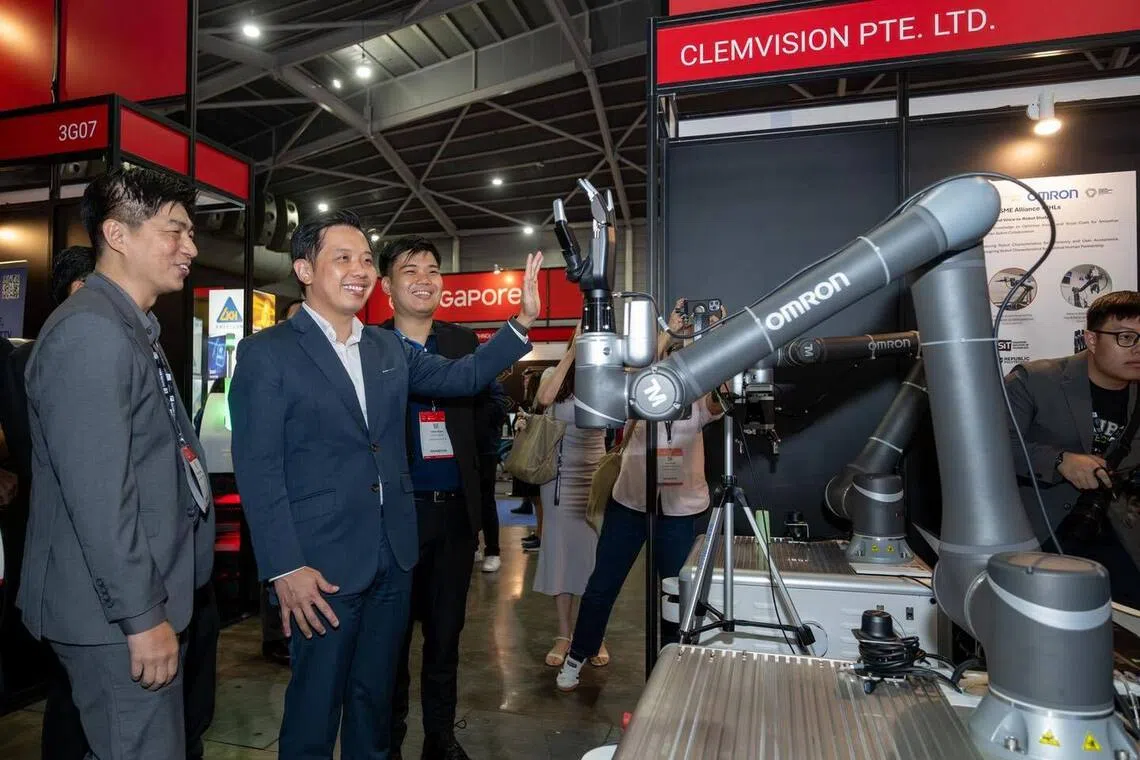SMEs going global, partnering with MNCs beneficial for both: Alvin Tan
Sign up now: Get ST's newsletters delivered to your inbox

Minister of State for Trade and Industry Alvin Tan (2nd from left) at the Industrial Transformation Asia-Pacific 2025.
PHOTO: ALVIN TAN/FACEBOOK
SINGAPORE - Small and medium-sized enterprises (SMEs) should seek to go global, given Singapore’s small market, said Minister of State for Trade and Industry Alvin Tan on Oct 17.
Going global can lead SMEs to partnerships with multinational corporations (MNCs) which are mutually beneficial, helping them to improve their capabilities and diversify supply-chain risks, Mr Tan added.
He was speaking on the last day of the Industrial Transformation Asia-Pacific 2025, held at the Singapore Expo.
During the event’s fireside chat with Mr Tan, company executives representing three successful cases of MNC-SME collaboration agreed that such partnerships have furthered their business goals.
One of the companies represented at the chat was Pratt and Whitney Component Solutions (PWCS), which specialises in aircraft component repair and overhaul at Seletar Aerospace Park.
In 2024, it partnered with home-grown enterprise Applied Total Control Treatment (ATCT), a surface finishing and non-destructive testing specialist, to support its operations.
What began as a supplier relationship has grown into a strategic collaboration. ATCT now provides Nadcap1-accredited solutions that boost PWCS’ quality, efficiency and supply-chain resilience, while PWCS has supported ATCT in building capabilities, gaining international accreditations and expanding regionally.
Mr Cabal Lo, chief technology officer of ATCT, said: “The collaboration between ATCT and PWCS is actually a big turning point for us; it allowed us access to the global standards when it comes to aerospace, which is earned through consistency, commitment to quality and compliance with the needs of international standards.”
MNC-SME partnerships have grown more important as economic nationalism becomes more prominent in the world, as seen with the China-US tariffs war
One company that has benefited from such partnerships is global automation and electronics maker Omron, which has a partnership with automation solutions company Clemvision.
The partnership, which began in 2018, started with a 3D vision system for warehouse automation and has since expanded to include artificial intelligence-driven robotic picking, stroke rehabilitation systems using vision-guided exoskeletons, and customised platforms for smart automation.
Working with SME partners has enabled Omron to work on niche business opportunities due to smaller businesses’ agility and deep domain expertise.
Omron has also helped to increase Clemvision’s engineering knowledge and business contacts, as well as clinical access and pre-approved certification.
3D-printing solutions provider Creatz3D saw its revenue soar two to three times since 2024, boosted by such partnerships with MNCs.
“One of our projects was with a fast-moving consumer goods company, which was looking for a solution to label their products more efficiently,” said Mr Sean Looi, general manager of Creatz3D, which was established officially in 2012.
Mr John Eng, vice-president of the Singapore Economic Development Board (EDB), said such collaborations enable MNCs to diversify their supply-chain risks, and allow local enterprises to build new capabilities and expand into new growth areas.

Mr Sean Looi, general manager of Creatz3D, with the company's 3D-printing solutions on display at the Industrial Transformation Asia-Pacific 2025.
PHOTO: EDB
“Many are longstanding collaborations across manufacturing sectors that Singapore is already well established in, including aerospace, medical technology and semiconductors. The types of partnership have also evolved through the years – from supplier development to co-innovation to other newer modalities like capability training, internationalisation and corporate venturing,” said Mr Eng.
Businesses can tap the Partnerships for Capability Transformation (Pact) scheme for funding support, according to EDB.
Pact also helps clear some of the initial partnership hurdles, such as helping MNCs to overcome business culture barriers with local enterprises, or familiarising them with a local enterprise’s operations.
The Pact scheme also helps local enterprises understand the full partnership requirements of the MNCs, especially if the business activity or technology is of a sensitive nature and is not publicised, said EDB.


